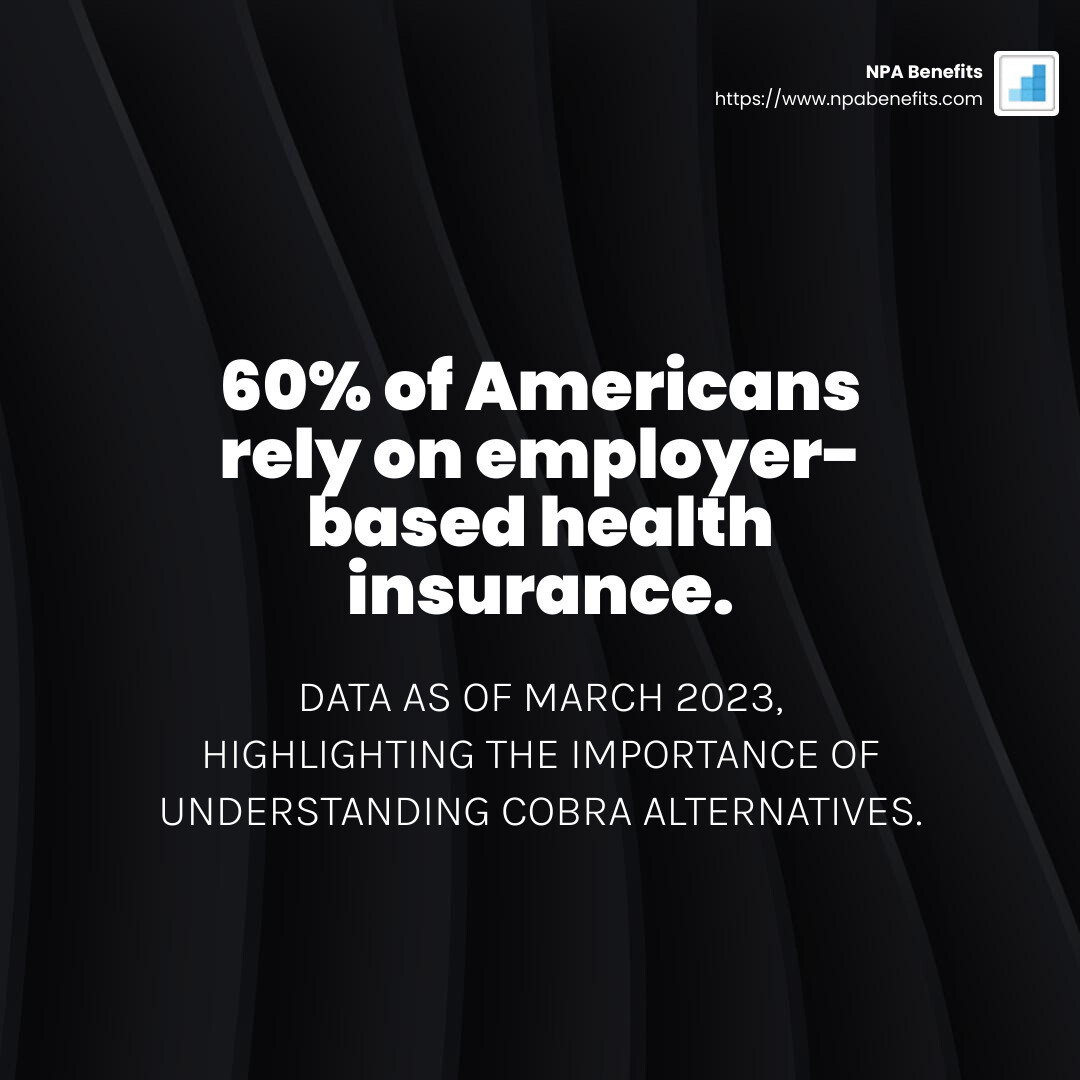When it comes to finding alternatives to cobra insurance, many individuals and business owners seek options that offer a combination of affordability and comprehensive coverage. COBRA insurance, while effective, can be expensive. If you’re in search of cost-effective solutions to maintain essential health coverage, consider these top choices:
- Health Insurance Marketplace Plans: Broad coverage options often with government subsidies.
- Medicaid: Low-cost or free coverage for qualifying low-income individuals.
- Short-Term Insurance Plans: More affordable temporary coverage for immediate needs.
- New Employer Plans: Enroll in health benefits through new employment.
Navigating health insurance doesn’t have to be overwhelming. Exploring alternatives to cobra insurance ensures that you safeguard yourself, your family, or your employees without breaking the bank.
I’m Les Perlson, and with over 40 years of experience in the health insurance industry, I’ve helped countless clients explore various alternatives to cobra insurance. My expertise lies in explaining complex insurance concepts and finding custom solutions that match specific needs.

Understanding COBRA Insurance
COBRA insurance is a way to keep your health coverage after leaving a job. It’s part of the Consolidated Omnibus Budget Reconciliation Act, which lets you continue your employer-sponsored health plan for a limited time. But here’s the catch—it’s often pricey.
Why COBRA Can Be Costly
When you were employed, your employer likely paid part of your health insurance premium. With COBRA, you cover the entire premium plus a 2% administrative fee. This can make your monthly costs skyrocket.

How COBRA Coverage Works
COBRA lets you keep the same health coverage you had while employed. This continuation coverage can last from 18 to 36 months, depending on why you lost your job. For instance, if you quit or get laid off, you can keep your coverage for up to 18 months. If you lose coverage due to a qualifying event like a spouse’s death or divorce, coverage can extend up to 36 months.
Who Qualifies for COBRA?
Not everyone is eligible. COBRA is available if you were enrolled in an employer-sponsored plan and your company had 20 or more employees. Smaller companies might not offer COBRA, but some states have similar laws for smaller employers.
When to Consider COBRA
COBRA can be a good choice if you’ve already met your deductible for the year and want to keep your current network of doctors and hospitals. It’s also useful if your employer’s plan covers pre-existing conditions better than other options.
The Bottom Line
COBRA is about keeping the same insurance—nothing changes except the cost. It’s a temporary solution, often used as a safety net while you explore other alternatives to cobra insurance.
Alternatives to COBRA Insurance
When COBRA seems too expensive, it’s time to explore other options. There are three main alternatives to COBRA insurance: Marketplace plans, Medicaid, and short-term insurance. Each offers unique benefits and can help you maintain coverage without breaking the bank.
Marketplace Plans
Marketplace plans, created under the Affordable Care Act (ACA), are a popular alternative. They offer a range of coverage levels, from Bronze to Platinum, letting you choose a plan that fits your budget and health needs. Plus, up to 80% of applicants receive government subsidies to help with premium costs.
Marketplace plans ensure you won’t be denied for pre-existing conditions. You can enroll during the annual Open Enrollment Period (Nov 1 – Jan 15) or within 60 days of losing your job-based coverage, which is considered a qualifying life event.
Medicaid and Government Assistance
If your income is limited, Medicaid might be the way to go. This state-run program offers low-cost or free health coverage for eligible low-income individuals and families. Each state has its own eligibility criteria, but generally, it’s based on income and family size.
For families with children who earn too much for Medicaid, the Children’s Health Insurance Program (CHIP) might be an option. It offers affordable coverage for kids and sometimes pregnant women.
Short-Term Insurance
Short-term health insurance is a stopgap solution for those transitioning between jobs or waiting for new coverage to kick in. These plans are often cheaper than COBRA but come with limits. They typically don’t cover pre-existing conditions and may offer fewer benefits.
Short-term plans are ideal if you’re in good health and need temporary coverage. They can last up to 90 days in most states, though some states have restrictions.

Choosing the Right Alternative
When deciding on an alternative to COBRA, consider your health needs, budget, and how long you need coverage. Marketplace plans offer comprehensive benefits and subsidies, Medicaid provides low-cost options for those who qualify, and short-term insurance is a quick fix for those in good health. Evaluate each option to find the best fit for your situation.
Affordable Care Act (ACA) Plans
ACA plans are a powerful option when you’re exploring alternatives to COBRA insurance. They offer comprehensive coverage and are designed to be accessible and affordable for many.
Coverage for Pre-Existing Conditions
One of the standout features of ACA plans is that they must cover pre-existing conditions. This means you won’t be turned away or charged more because of your health history. This is a huge relief for many, especially those who need regular medical care.
Government Subsidies
Another big advantage of ACA plans is the potential for government subsidies. These subsidies can significantly reduce your monthly premium costs. In fact, up to 80% of people who apply for an ACA plan qualify for some form of financial assistance. This makes ACA plans a more affordable choice compared to COBRA, which often comes with high premiums.
Open Enrollment Period
It’s important to know when you can sign up. The ACA has a specific Open Enrollment Period each year, from November 1 to January 15. During this time, you can choose a new plan or change your existing one. If you miss this window, you might still qualify for a Special Enrollment Period if you have a life event like losing your job or having a baby.
ACA plans offer a safety net with their comprehensive coverage and financial support options. They’re a great choice if you’re looking for a long-term solution that doesn’t compromise on care.
Short-Term Health Insurance Options
When you’re in between jobs or waiting for new health coverage to kick in, short-term health insurance can be a lifesaver. These plans offer temporary coverage to bridge the gap until you secure a more permanent solution.
What is Short-Term Health Insurance?
Short-term health insurance, often called “gap insurance,” is designed for those who need immediate, short-term coverage. It’s a quick fix for those unexpected moments when you’re without regular health insurance. The coverage can start as soon as the next day after you apply, making it a convenient choice for many.
Who is Eligible?
Eligibility for short-term plans can vary based on your age and the state you live in. Some states have restrictions, so it’s important to check what’s available where you are. Generally, these plans are ideal if:
- You’re in good health with no pre-existing conditions.
- You’re not pregnant or planning to become pregnant soon.
- You need a short-term solution while waiting for a more comprehensive plan to start.
Key Features
Flexibility and Cost: Short-term plans are often more affordable than COBRA coverage. They offer basic protection at a lower cost, which is great if you’re on a tight budget.
Duration: You can keep a short-term plan for up to a year in some states. However, be cautious about the end date; ending a short-term plan won’t trigger a special enrollment period for ACA plans.
Limitations: While these plans are budget-friendly, they typically don’t cover pre-existing conditions or offer the same level of benefits as ACA or employer-sponsored plans. This means you might face higher out-of-pocket costs if you need extensive medical care.
Short-term health insurance is a practical choice when you need coverage fast but don’t want to commit to a long-term plan. It’s a stopgap measure, perfect for covering those tricky in-between times without breaking the bank.
Medicaid and Government Assistance Programs
When it comes to finding alternatives to COBRA insurance for low-income individuals, Medicaid is a standout option. It’s a government program that provides comprehensive health coverage at little to no cost for those who qualify.
What is Medicaid?
Medicaid is a joint federal and state program designed to help individuals and families with limited income access healthcare. It’s the nation’s largest health insurance provider, covering millions of Americans, including some seniors and people with disabilities.
State Eligibility
Eligibility for Medicaid varies by state, as each state sets its own income limits and other criteria. Generally, your eligibility is determined by your income, family size, and specific circumstances like pregnancy or disability. For instance, in states that have expanded Medicaid under the ACA, individuals earning up to 138% of the federal poverty level can qualify.
To check your state’s specific eligibility requirements, you can visit Medicaid.gov.
The Children’s Health Insurance Program (CHIP)
For families with children who don’t qualify for Medicaid, CHIP is a valuable resource. CHIP provides health coverage to children in families with incomes too high for Medicaid but too low to afford private coverage. In some states, CHIP also covers pregnant women.
Like Medicaid, CHIP eligibility and benefits can vary by state. It’s worth visiting your state’s CHIP website or HealthCare.gov to learn more about the options available to you.
Why Consider These Programs?
Medicaid and CHIP offer comprehensive coverage, including essential health benefits like doctor visits, hospital stays, and prescription drugs. For those who qualify, these programs can be a much more affordable option than COBRA, which often comes with high premiums.
If you’re struggling to afford COBRA or don’t qualify for other insurance plans, exploring Medicaid or CHIP could provide the coverage you need without the hefty price tag.
These government assistance programs are essential lifelines for many, ensuring that everyone, regardless of income, can access necessary healthcare services.
Frequently Asked Questions about Alternatives to COBRA Insurance
What can I do instead of COBRA?
If COBRA feels too expensive or restrictive, don’t worry—there are other options. Marketplace plans are a popular choice. They are available through the Affordable Care Act (ACA) and you can enroll during a special enrollment period if you’ve lost your job-based coverage. These plans often cost less than COBRA and might come with government subsidies to lower your premiums.
Another option is Medicaid, which provides low-cost or free health coverage for eligible individuals and families. If you have children, the Children’s Health Insurance Program (CHIP) might be a good fit. It offers coverage for kids in families that earn too much to qualify for Medicaid but still need assistance.
Is there a better alternative to COBRA?
ACA plans are often seen as a better alternative to COBRA. They cover pre-existing conditions and offer a range of coverage options. Most importantly, many people qualify for subsidies that make these plans more affordable than COBRA.
The catch? You need to enroll during the open enrollment period, which runs from November 1 to January 15 each year. But if you lose your job-based insurance, you get a special 60-day window to sign up.
How to avoid COBRA insurance?
To avoid needing COBRA, explore alternative plans as soon as you lose your job. You can look into marketplace plans during your special enrollment period or see if you qualify for Medicaid or CHIP.
Always check the eligibility criteria for these programs. For example, Medicaid eligibility varies by state and is generally based on income and family size. If you qualify, these plans can be a cost-effective alternative to COBRA.
By understanding your options and acting quickly, you can maintain health coverage without the high costs associated with COBRA.
Conclusion
Navigating the maze of health insurance options can feel overwhelming, but there’s no need to tackle it alone. At NPA Benefits, we specialize in providing flexible and cost-saving health insurance solutions custom to your individual or business needs.
Our focus is on giving you control over your health coverage. Whether you’re looking for self-funded plans or exploring alternatives to COBRA insurance, we offer options that fit your lifestyle and budget. Our plans are designed to adapt to the changing landscape of healthcare, ensuring you have the right coverage when you need it.
Why Choose NPA Benefits?
-
Flexible Options: We provide a wide range of health insurance plans that can be customized to meet your specific needs. Whether you’re an individual seeking coverage or a business looking to offer comprehensive benefits to your employees, our solutions are designed with flexibility in mind.
-
Cost-Saving Solutions: Our plans are not just about coverage—they’re about value. By focusing on cost-saving strategies, we help you maximize every dollar spent on health benefits. This means more predictable expenses and potential savings on premiums.
-
Expert Guidance: Understanding health insurance doesn’t have to be complicated. Our team is here to guide you through the process, ensuring you make informed decisions that benefit you and your family.
Choosing the right health insurance alternative is crucial for your peace of mind and financial well-being. Let us help you find the perfect fit for your health coverage needs.
Explore our flexible health insurance options and find how NPA Benefits can make a difference for you.






